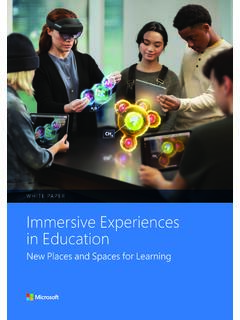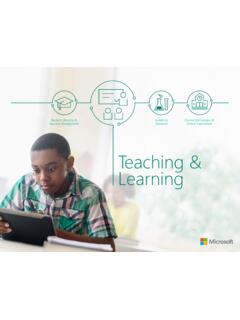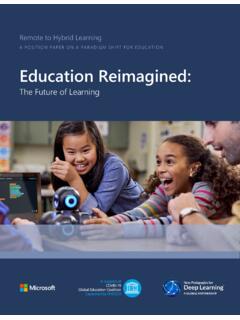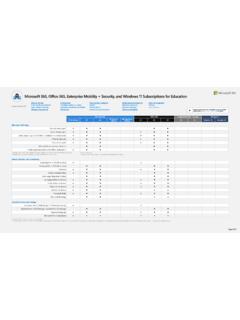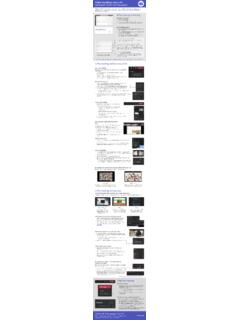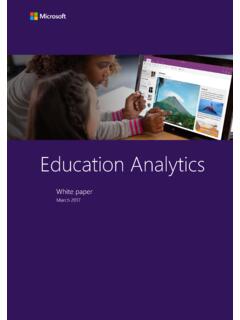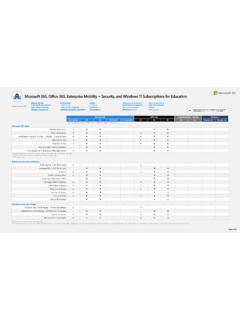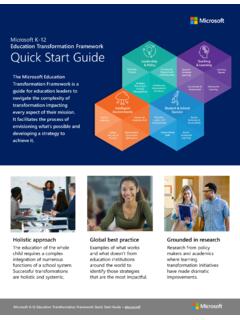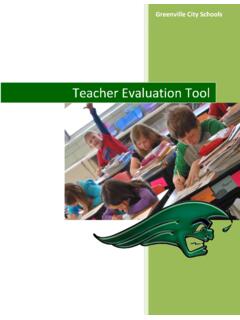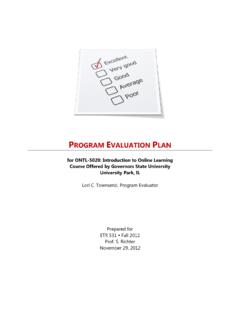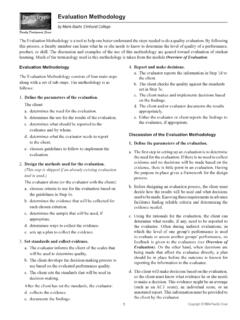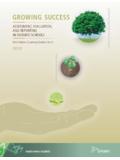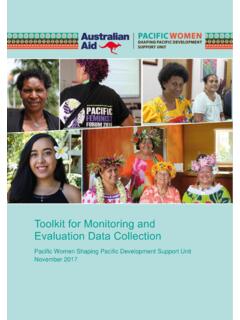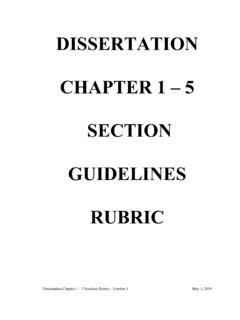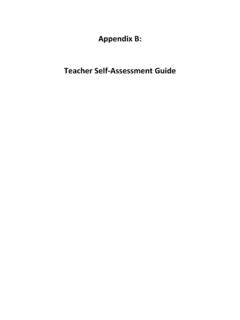Transcription of Showcase School Rubric
1 Metric Leading Advancing Developing Initiating The School demonstrates thought-leadership in building a School -wide vision as the starting place for a holistic digital transformation using Microsoft s Education Transformation Framework Informed by research and potential models Has specific, concrete goals for the outcomes of digital transformation Clear and easily communicated vision shared by leaders and all stakeholders, Uses technology as a strategic lever where digital access is not the end goal; learning is the goal and technology is a means used to achieve that goal Descriptors adapted from ETF Has developed a shared vision and plan for holistic transformation that incorporates all four pillars of the ETF Has begun the collaborative process of envisioning for holistic transformation with focus on some of the ETF pillars Has created a vision statement driven by current practice or incremental improvement versus focused on transformation Has not yet developed a long-term School vision for education transformation School leader(s) foster a culture of learning and growth mindset as evidenced by their commitment to creating sustainable change in teaching and learning practices through continuous and job-embedded professional development strategies.
2 Builds teacher effectiveness through intensive focus on meaningful and continuous professional learning Establishes mentoring, coaching, and collaboration opportunities at the School Empower teachers to make their own decisions and take risks to meet the needs of every student Drive efforts to connect with other leaders and educators locally and globally to share best practices Descriptors adapted from ETF Strategic and School -wide plans are in place to develop leaders and educators capacity for transformation Coaching and mentorship and a continuous growth cycle is in place for all teachers and leaders Learning communities internally and externally are leveraged Tools and learning resources are part of teachers onboarding and continuous development plans Teachers are leaders who help shape the School s strategic plans Professional development is planned for a select group or a specific initiative Learning communities (internal and external)
3 And job-embedded collaboration opportunities are established by leadership Support for the identified tools and resources is in place Teachers are encouraged to share their innovations with others Some educators leverage professional development opportunities to enable education transformation Some learning communities and opportunities for collaboration are beginning to be consistent Tools and learning resources are identified for teachers to use in their professional learning journey Teachers have the autonomy to innovate in their own classrooms Professional development is mostly training when needed on specific tools Learning communities and collaboration among teachers happen in an ad-hoc manner Tools and learning resources are accessible for educators and leaders Teachers can suggest new ideas School leader(s) drive personalized learning to meet the individual student s academic, emotional, and social needs and help every student realize their full potential.
4 Inclusion and accessibility are integral to policies and practices. Professional development on personalized learning leveraging technology such as Office 365 for Education, Teams (Staff/Faculty/Student), OneNote, Skype, Flipgrid, and Minecraft Students are encouraged to take greater responsibility for their learning The School provides accessible technology that can meet the needs of all students Descriptors adapted from ETF Inclusive environments with equitable access and accessibility for all students can be observed throughout the School Educators master strategies to support curriculum and assessment for the real world throughout the curriculum Personalized learning strategies are regularly used to empower students to own their learning Inclusive environments with equitable access and accessibility for most students can be observed throughout the School Educators are trained on strategies to support curriculum and assessment for the real world throughout much of the curriculum Personalized learning strategies are periodically used to empower students to own their learning
5 Inclusive environments with equitable access and accessibility for some students can be observed in some classrooms Educators are provided with strategies to support curriculum and assessment for the real world in some areas of the curriculum Personalized learning strategies are used by some teachers with few students to enable them to own their learning Inclusive environments with equitable access and accessibility for students isn t readily observed in the School Educators are not provided with strategies to support curriculum and assessment for the real world Learning is not currently personalized to empower students to own their learning The School demonstrates innovative use of technology, using Microsoft solutions, to drive positive impact and student success with future-ready skills Computational Thinking Thinking about problems strategically in all curricular areas to create solutions through abstraction, algorithms, decomposition, and pattern recognition Creativity and Innovation Using ingenuity and imagination, going outside conventional boundaries, when shaping ideas into a product Critical Thinking Integrating relevant and sufficient information to address an essential question, gathered from multiple and varied sources Collaboration Sharing responsibility to make substantive decisions together about the content, process.
6 Or product of the work Communication Producing extended or multi-modal communication Descriptors adapted from Jeannette Wing s work and 21 CLD The School is actively developing all future-ready skills for its entire student population in an age appropriate manner There is evidence that most students are demonstrating future-ready skills in their work on a regular basis The School is actively developing specific future-ready skills for a specific group of students There is evidence that some students are demonstrating future-ready skills in their work on a regular basis Some teachers are beginning to include some future-ready skills in their lesson plans. Students are not assessed on those skills nor are they demonstrating these skills yet Future-ready skills are developed outside of the core curriculum through enrichment classes to select students Few teachers are beginning to look for ways to develop one or more of the future ready skills with their students Future-ready skills are introduced outside of the core curriculum through one-off type of events to select students Data insights provide guidance for education improvements and visibility into the progress towards the digital transformation vision.
7 Use data to inform decisions Leaders use metrics to define and measure progress and course correct where needed Monitoring and evaluation results are shared with stakeholders for transparency, buy-in, and participation Data is shared with all stakeholders to ensure constant alignment on direction Data is not only used to monitor and evaluate progress towards vision and goals, it s also used for predictions and identification of future opportunities Identify data to be collected to measure progress towards the vision Establish a process to review the data and take actions based on insights Feedback data is captured via surveys and basic tools Incremental improvements are sometimes made based on the feedback data Vision and metrics for education transformation have not been developed Showcase School Rubric
